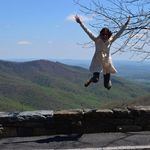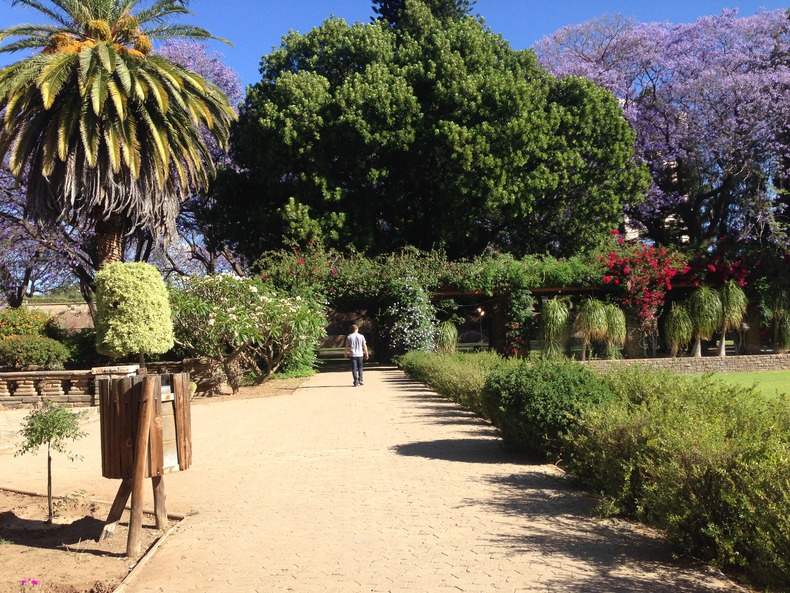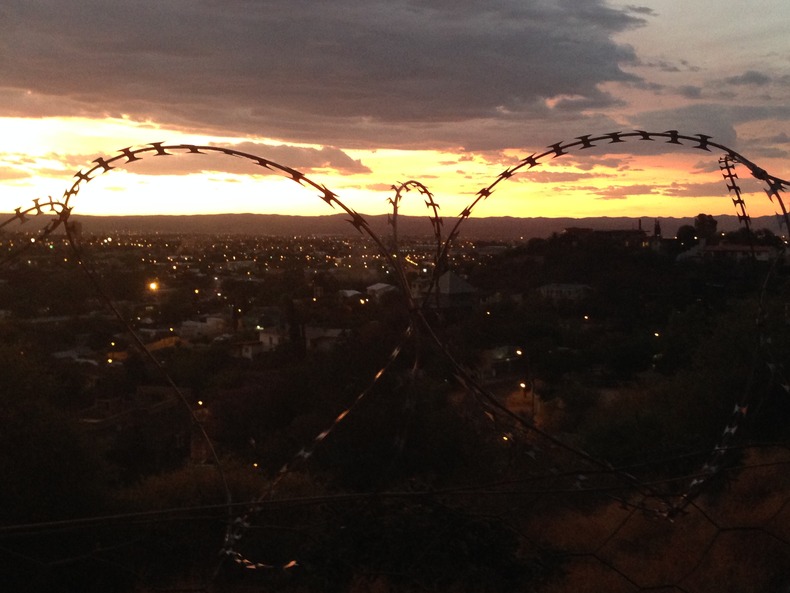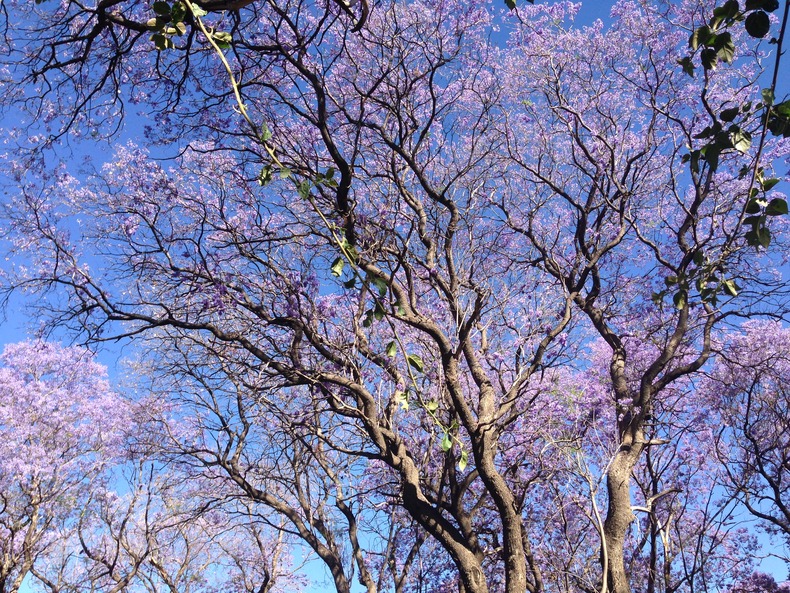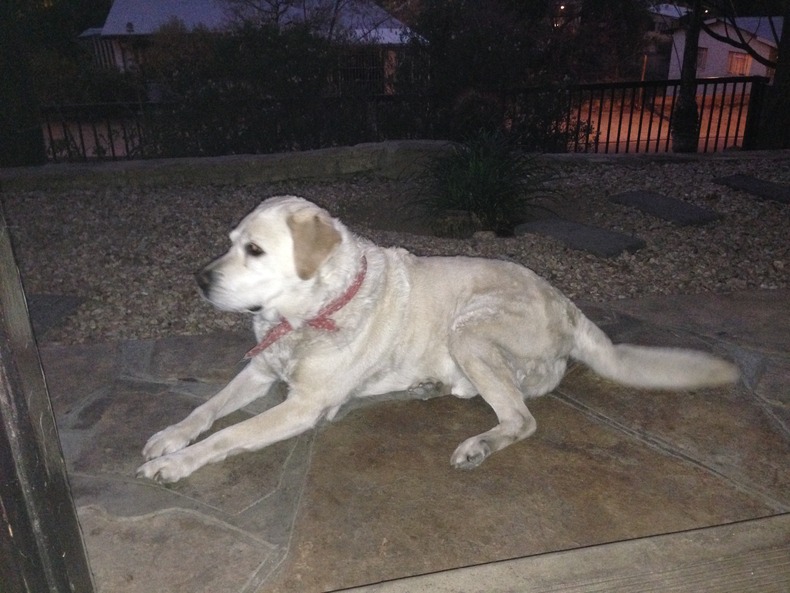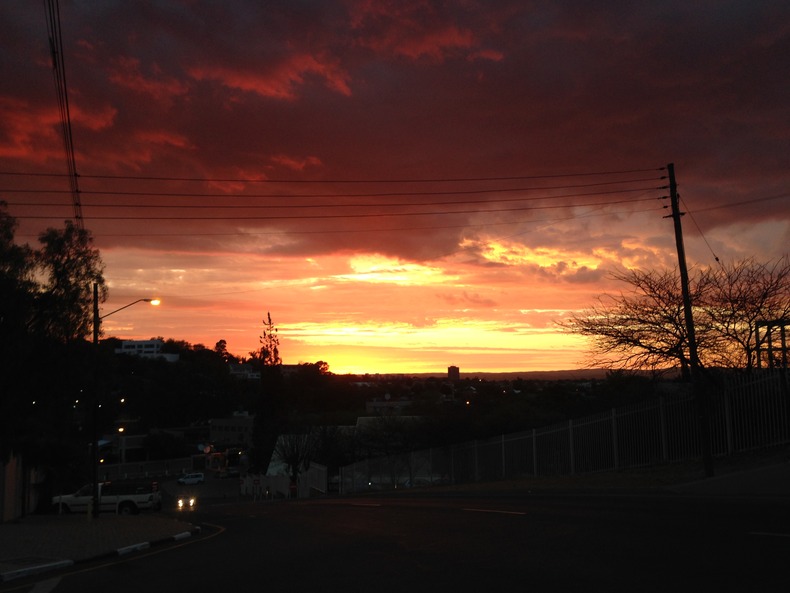-Andrew walking through the Parliamentary Gardens
I have been asked by several individuals what life is like in Namibia. It’s both very similar and very different from life in the U.S. In Windhoek, most offices open at 8:00 am so I typically wake up around 6:30. Walking to work is certainly an experience. There are virtually no sidewalks in my area and drivers do not really agree with the notion that pedestrians have the right of way. There are also very few crosswalks and even where they do exist, there is still a pretty strong likelihood you could get hit if you cross. I waited to cross the road for about 15 minutes today (and even when you are finally able to cross, you sometimes have to cross halfway and then wait in the middle of the road which has no median and meanwhile cars are flying past you).
Walking in Windhoek is not just an experience because of the traffic and drivers’ disregard for pedestrians’ lives, but because very few white people walk to work (this is true in our area though this seems to generally be the case in most parts of the city). The State Department highly recommends getting and using a car, indicating that it is not a luxury but a necessity. I don’t necessarily agree that everyone should drive and not walk to work. I think walking should be encouraged.
I think that at least some people don’t walk much in Windhoek because they are afraid. And maybe this was warranted in the past due to very high crime rates, and maybe it is even warranted to some extent today. But I don’t think living exclusively behind high gates and being afraid to walk in your own city will make anything better. Racial and economic disparity will not improve until people stop living separate lives, until they live as a community.
-Windhoek, seen through a barbed wire fence
-Jacaranda trees in bloom, October
The work at the Legal Assistance Centre is quite interesting—my Fulbright research and what I work on for the organization. For example, I walked into my office the other day and my boss told me that we were filing a constitutional challenge to an election restriction which effectively prevented some absentee voters (but not others) from casting their ballots. A government official had publically stated that students and those working for private companies (and others) would not be allowed to vote in foreign embassies, but those working for the government, including individuals in the military, would be able to do so. Andrew and I immediately began researching the relevant case law and prepared to start writing the Headings (or brief). LAC filed the initial complaint and the next day the Government backtracked. They denied ever having had a policy that would discriminatorily prevent some voters from casting absentee ballots (which would almost certainly been unconstitutional). So now everyone can vote in the election later this month—hooray!! If only all battles in life were resolved so quickly and efficiently.
Logistical things tend to be complicated here (e.g. buying the groceries you want, and getting visas is simply a NIGHTMARE) and we have been discouraged from using credit cards (this is a big adjustment for me since I tend to never carry cash). It’s even more difficult to get some things done since everyone also discourages the use of the unregulated street cabs. There have been several coordinated robberies by street cabs in Windhoek, a Peace Corps volunteer’s backpack stolen was stolen (with a laptop and cell phone) and some former interns at LAC, despite being together, were also robbed. In both cases, the victims were overpowered by several persons and their belongings were taken, but luckily no one was physically harmed. Although the latter incident and the perpetrator cab’s number were reported, the police did nothing. We have not confirmed that the numbers on street cabs in Namibia mean anything—it is not clear that they are registered by the Government or regulated in any way, which is reminiscent of the pre-medallion era in NYC.
An additional interesting fact is that if you are in a street cab, the driver might pick up one, two, or three more people afterwards, while you are still in the car on the way to your destination. It sounds like this is how the robbery of the Peace Corps volunteer was facilitated. In that case, it seems that she was in a cab and then a few more individuals got in the car after her (who were all ultimately involved in the robbery). When Andrew and I are together, we feel ok taking street cabs during the day but we certainly avoid them at night or when we are alone.
You can get most types of foods in restaurants in Windhoek—burgers, pizza, chicken, etc. and I’m not sure that there is much distinctively “Namibian” food aside from braii, which is like barbeque. The braii here is taken quite seriously and there are many methods, techniques, and tools utilized in creating the perfect meat-focused meal. If there is a “food of Namibia,” it is certainly meat. One other delicious food is the koeksister which is essentially a deep fried doughnut-ish thing, only much more delicious than a doughnut. A koeksister probably has enough calories to sustain a family of four for an entire day.
Life is good here. It’s interesting and comparatively modern to some countries in the region. There are modern conveniences (refrigerators, kitchen devices, electronics etc.). There are roads (though outside of the city they might not be excellent), telephones, computers, and good drinking water (depending where you live of course). I can even use my iPhone since I purchased a local sim card. Also, most people speak English, though most also speak at least one additional language. Due to my line of work, in some ways my life is easier here than in the U.S. since the Namibian Government ratifies human rights treaties and the LAC is able to work with the Government fairly often (rather than always being adversarial). Although Namibia has a lot of work in terms of realizing human rights generally and for women and LGBT persons in particular, I am quite hopeful for the country and feel very lucky to spend nine months here.
-Poncho, our landlords' (now our friends) dog (and guard dog)
-Our street at sunset
Living in the world. Humanitarian. Advocate for health, human rights and equality. Documenting experiences and observations.
